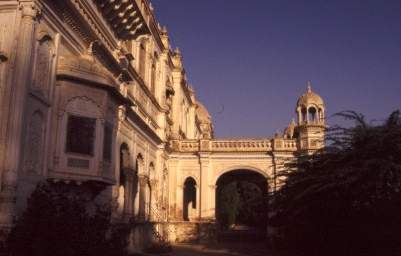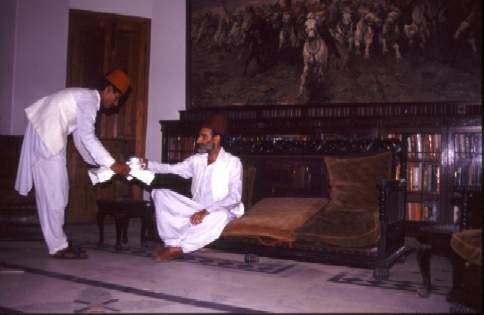THE LAST NABOBS ARE WELL, ALIVE, AND STAY IN PAKISTAN (part 2) HH
PRINCE FALAHUDDIN ABBASI, NABOB OF BAHAWALPUR
 Dera Nawab Sahib is a lost county in the heart of the rich province of Punjab. A few miles away from the overcrowded historic city of Bahawalpur, a narrow road where the noise of horseshoes is more common than the one of the cars, goes to a end on a high gate: a richly iron mastered entrance, opening on a luxuriant park. Behind a welcoming ecologic fortification, made of palm trees, eucalyptus and wild rose-bushes with precious smells, stands an immaculate-white palace. Pure and majestic, impressive though decaying like an abandoned cinema setting. No noise; except the whistle of a multicoloured bird of Paradise, flying from a collapsing balcony to a century old tree with oversized roots cracking up the walls of the building. Even the wind dares not breaking the depth of the deathly silence.  Sleeping beauty’s castle, Sadiq Garh Palace was built up in 1880 by the Nawab (nabob) of Bahawalpur: sybarite and voluptuary. Adept of lucre and pomp. Pomp of power, first of all. Sovereign of what remained, from 1784 untill the 1947 "partition", the Principality of Bahawalpur, the Nabob was the unique master after Allah on the all county. 17000 square miles lands surrounded the 100 rooms Sadiq Garh Palace and its private mosque. 1100 serves were attached to the property: maintaining the building, the park, the private gardens, the farms, the water mills and the electricity plants. Very dedicated to the new technologies, the Nabob controlled in 1918 the first fleet of hydroplanes in the sub-continent: based in Karachi, this was the ancestor of what would become some decades later the PIA national airlines of Pakistan. Young,
tall, his hieratic face covered with meticulously cut beard, a red
“fez”
on his head, His Highness Prince Falahuddin Abbasi looms from the main
alley of the park, lined up with anachronic gas street-lamps installed
by his step grand father one century ago. Taking his peerage from the
illustrious
Nabob Bahawal Khan I (who gave its name to the county), he takes care
of
this cyclopean property with his senior brother: HH prince Salahuddin.
Which is quite a heavy duty. Despite of its remarkable architecture, it
doesn’t focus much attention from part of the Pakistanis
administration.
The budget allowed for maintaining this landmark of the cultural
heritage
is scarce. A few kilometres away, in the neighbouring India, such a
property
would have been converted into a five star hotel. With daily incoming
by
full pullman buses. But, contrary to India, Pakistan still preserves
-even
if not so voluntarily- its feudal way of life: which explains somehow
the
attraction this country exerts on the lucky adventurous traveller. One
day in the company of an Indian “hotelier-maharaja” can be paid cash or
by credit card; but acquainting with a Pakistanis nabob is a present
and
a privilege. There is no price, here, for hospitality. It is given,
free
of charge, to the one entitled to this favour.
 Prince Fahuddin Abbasi invites us in quite a modest "baithak": a morning room, common in almost all Pakistanis home. An obedient servant brings the traditional green tea, served with cookies and other pastries. Curiously, the other rooms of Sadiq Garh Palace remain closed. "-I don't even get the keys!", the prince says with this slightly disabused and distinguished accent he caught from his education in Atchison College, the very posh boarding-school in Lahore. Nickname "The Nabobs’ college". Though his brother Salahuddin, -"Super Paks" (member of elite), Amir of Bahawalpur- is a MP, representing the influent PML (Pakistan Muslim League), the Abbasi still can't use the rooms... of their own palace ! Because of bureaucracy, the government still controls the use Nabobs of Bahawalpur make of their family palace! Fixing also the limit of their land to 60 acres “only”. Of course, same law applies to all nabobs in Pakistan. Don’t get your handkerchief out: those happy few get a way-of-life everybody would envy! With money in the pocket and in the safe (which is often Swiss)! Producing in their gardens delicious fruits, like orange or mango, traded but also traditionally distributed among the influent notabilities (all old school mates) of the provinces. Not to forget the politicians in Islamabad, often linked to a same peerage. In Pakistan, in the society at least, everybody is cousin! As a matter of fact this is little bit exaggerated; though not completely wrong. The tie of kindred often mixes up with tie of cast, and a strong brotherhood unites the "Super Paks": hundreds of super rich in a country with millions of super poor creates should unite to survive the system. All the governors of Indies, viceroys (like Lord Montbatten), king Faycal, prince of Wales, were the guests of Sadiq Garh Palace. Witness of the olden days, one can still see the yellowish pictures in silvered frames, the flaring paintings, the items and precious books prince Falahuddin cautiously preserves in another palace (the family owns "half dozen" in Bahawalpur !) located just behind Sadiq Garh Palace. There lives the nabob, who waited the departure of our local guide and driver to show us the property around. This superb "outbuilding" has not been spoiled by the years. The interior garden, warm and intimate, remembers the "patios" of the Alcazabas in Granada or Sevilla,: with its luxuriance and humidity, favourizing the peace of body and soul. This is the place, indeed, to relax into a comfortable cane armchair, with green tea served on a silver tray, reading one of the red binded book from Rudyard Kipling handed from the mahogany wooden library, just to feel like in the nostalgic and wonderful atmosphere of the Empire., One would like, too, playing cricket on the so well maintained green surrounding the palace. Kipling
once wrote that he met the last Nabobs; people like prince Falahuddin
Abbasi
just put on evidence that he was wrong. They still exists those so
picturesque
landowners, descendant of the Moghuls who fought and killed
Alexander-the-Great,
in a country of culture, traditions and old fashion virtues. Such is
the
21st century Pakistan . Warm and generous country, where the visitor
doesn't
need to push the doors to make them wide opened. Miracle of
hospitality,
not only the Nabobs but the common herd know, as the saying goes, that
"Noblesse oblige"! By Gilles Malaisé Part
1: The last nabobs are well, alive, and stay in Pakistan
|





